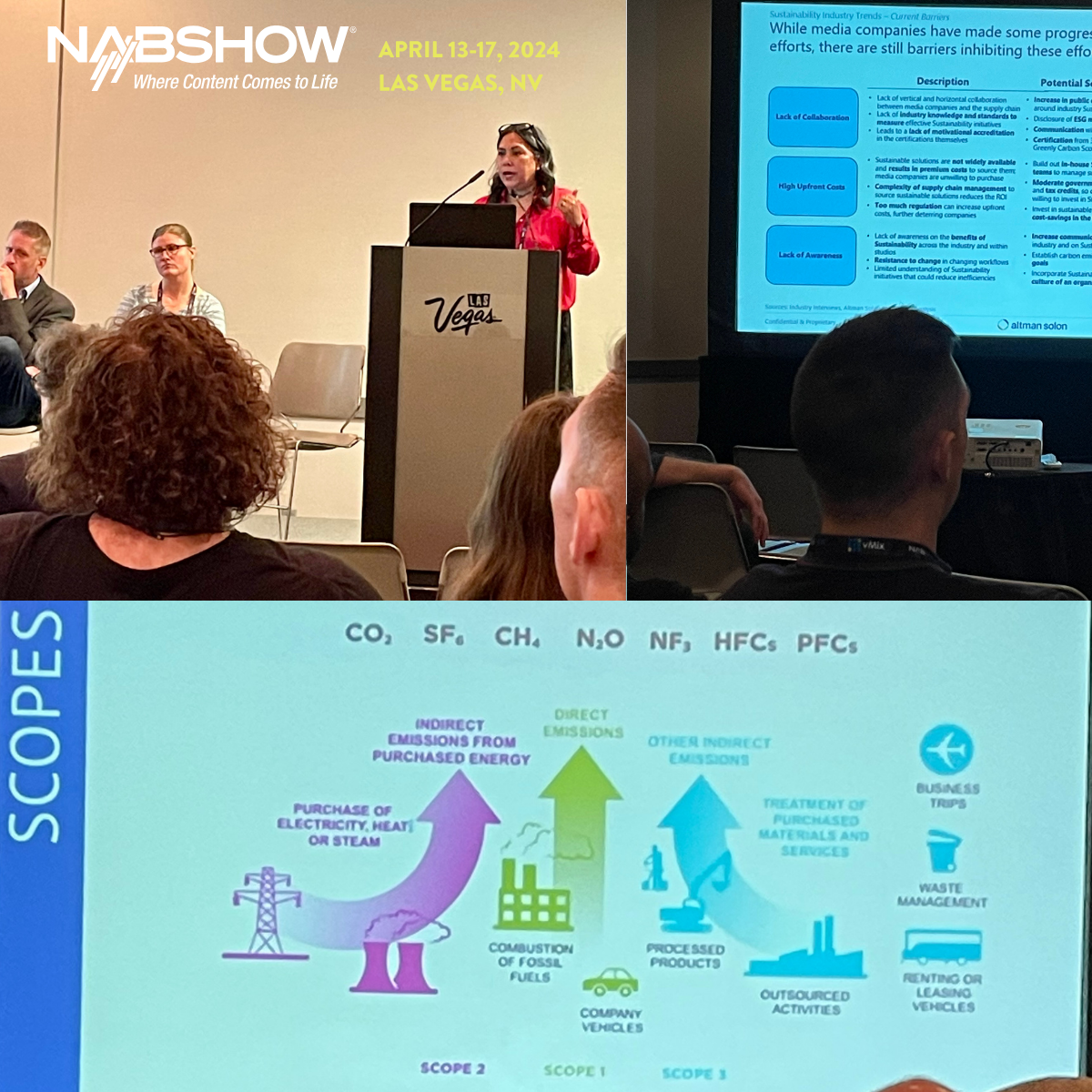Notes from NAB 2024 – making a positive impact
Sustainability in Media “This is a movement” and as we know movements have enormous potential for change.
In a few hours’ time, NAB will open its doors and companies across the media landscape will showcase their latest technology innovations. Interesting spin-off events across this four-day extravaganza provide a space for like-minded folk to gather and discuss key topics and trends that have an impact on the way we do business.
Our PR Strategist and Content Developer, Kate Ford, attended the Sustainability in Media 101 Workshop, Transforming the Media Landscape Through ESG Integration, run by Media Tech Sustainability Series (MTSS). This fascinating four-hour mini conference featured experts and vendors who are committed to exploring the positive and negative impact their companies have on the planet, people and profit and the workshop provided a platform to discuss new ways of working to reduce their carbon footprint and to improve working practises.
At Jump, we’re at the start of this journey and it was truly inspiring to be in a room with so many knowledgeable people who are passionate about working together to create change. Taking a magnifying glass to your business is not easy, for years companies in industries across every sector have been focussed on growth and profit without a real focus on how that growth affects the climate. But it doesn’t have to be that way, and regulations are fast developing to ensure businesses are accountable for their environmental footprint.
We know climate change is a threat to our survival not just in business but in everyday life and we have a responsibility to get our house in order. This shouldn’t be viewed as a frightening prospect, yes, it’s a lot of work that will take dedication and commitment from the top down. As Zena Harris, Founder and President of Green Spark Group said, “Breaking patterns is how we change.”
So, what’s stopping companies from embracing these changes? Derek Powell and Fady Rashmawi from Altman Solon explained there are three barriers holding companies back. The first is a lack of vertical and horizontal collaboration between media companies and the supply chain, the second is a lack of industry knowledge and standards to measure effective sustainability initiatives as well as high upfront costs and a lack of awareness, which leads to the third, a lack of motivational accreditation in the certifications themselves. But as the pair pointed out there are solutions, starting with an increase in public conversation around industry sustainability efforts, disclosure of ESG metrics, communication with supply chain and certification from third-parties (albert, Greenly Carbon Score and the EMA).
The fear of greenwashing is also real, Powell and Rashmawi highlighted “greenhushing” a term that’s new to us, where companies don’t publicly disclose their sustainability work through fear of greenwashing accusations. Honesty and transparency are key and discussions without judgement need to be had to provide encouragement for businesses to move forward.
There are companies in the industry who are doing great work. Jennifer Sandoval from Earth Angel is inspiring, the company provides a range of services to help productions reduce their impact such as the Good Riddance service, which includes disposing of material waste from productions in a responsible way. It was fantastic to hear James Stellpflug, SVP at EVS talk about how they collect and store rainwater (a topic close to my heart) at their Belgium HQ and use it to cool the building. EVS has a core ESG team focussed on sustainability goals, encouraging staff across the company to share and develop ideas. Ben Schwarz from Greening of Streaming discussed the addition of metadata at various points in video streams to measure energy use. And Andy Rayner, CTO, Appear, talked about the BBC’s supply chain impact, he said scopes 1 and 2 make up only two percent of the broadcaster’s carbon footprint the rest is scope 3, 80 percent of the BBC’s carbon emissions come through their supply chain.
I want to thank Lisa Collins and Barbara Lange for creating this exciting event. I came away feeling enthused by the speakers and hopeful for the future. This conference will grow quickly, as one of the speakers pointed out “this is a movement” and as we know movements have enormous potential for change.
Kate Ford


